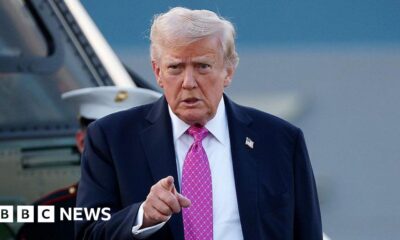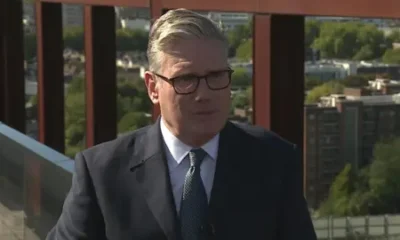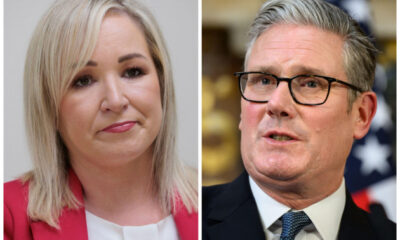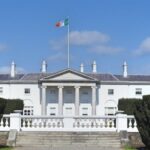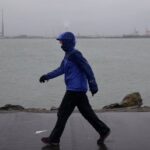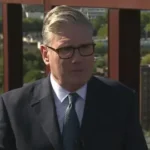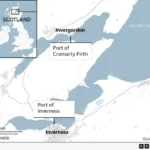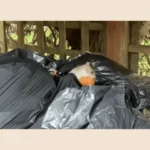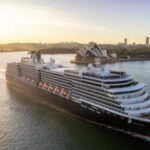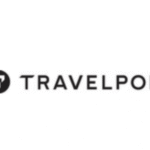Business
Sign off for Highlands green freeport plan for 11,000 jobs
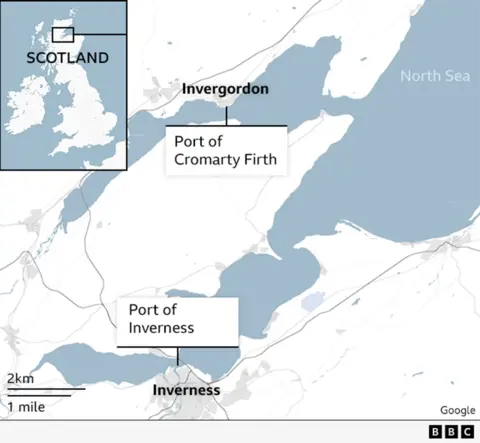
Read more on post.
Steven McKenzieHighlands and Islands reporter
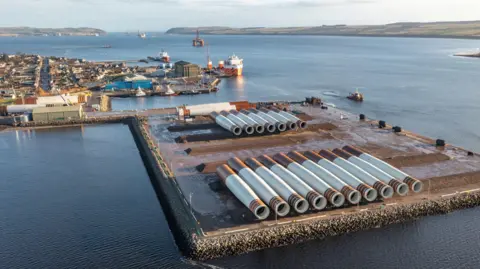 Port of Cromarty Firth
Port of Cromarty FirthA landmark agreement will be signed later concluding a five-year planning process to establish a green freeport in the Highlands.
Inverness and Cromarty Firth Green Freeport (ICFGF) is expected to generate more than 11,000 jobs over the next 25 years.
It aims to become a major international hub for the offshore renewable energy sector – made up of zones where tax incentives and lower tariffs are available to companies.
The agreement will be signed between the port, the UK and Scottish governments and Highland Council.
The agreement, called a memorandum of understanding (MOU), creates a formal framework for co-operation and responsibilities around the running of the port.
The signing also unlocked £25m of UK government seed funding, financial support provided to companies in their early stages, to support local infrastructure projects.
ICFGF is a partnership of private and public sector organisations, and its directors include bosses at Highland Council, University of the Highlands and Islands, SSE Renewables and Global Energy Group.
It has six main sites including Port of Cromarty Firth in Invergordon, Port of Nigg, Highland Deephaven near Evanton, and Inverness Campus.
Over the next 25 years, ICFGF said it expected to create thousands of “high-quality” jobs, many of them in the offshore wind sector.
It also said the port would attract more than £6.5bn of investment.
‘Pivotal moment’
Scottish Secretary Douglas Alexander said setting up ICFGF was a “pivotal moment” in the UK government’s mission to boost economic growth across the UK.
He said: “The freeport has the potential to show that we can transform places that benefitted from the oil and gas industry half a century ago.
“Inverness and Cromarty Green Freeport will transform the economy of the Highlands, as well as playing a key role in our clean energy future.”
Scotland’s Deputy First Minister Kate Forbes said the signing was an “exciting milestone” that could bring up to 11,300 jobs to the Highlands.
She told the BBC Radio’s Good Morning Scotland programme the freeports had been “very carefully designed” around workers rights.
She said UK and Scottish ministers had ensured such sites comply with their Fair Work First policy.
Forbes denied suggestions that green freeports were an example of “greenwashing” and said some of the guarantees secured in Scotland, particularly on fair work, were now being rolled out across the UK.
ICFGF chief executive Calum MacPherson said the port’s ambition was to deliver “positive change” for the economic prosperity of the Highlands.
Where is the Inverness and Cromarty Firth green freeport?
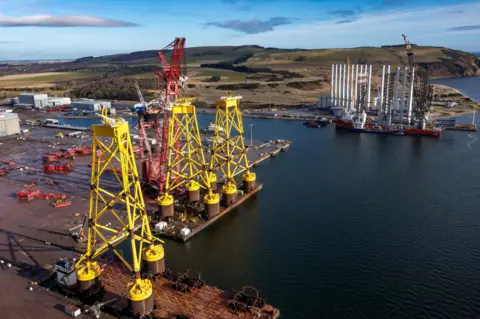 Port of Nigg
Port of Nigg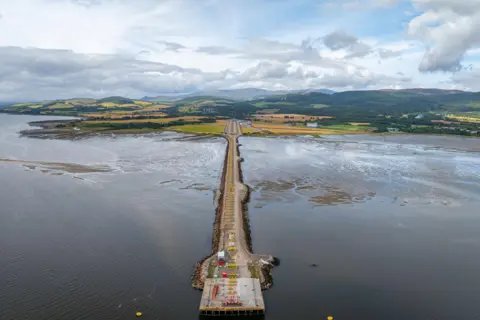 Highland Deephaven
Highland DeephavenWhat is a green freeport?
Green freeports are places inside a country’s borders where normal tax and customs rules do not apply in full.
In Scotland, a port’s boundaries are agreed by both the Scottish and UK governments.
Green freeports contain two types of sites where the special rules apply – tax sites and customs sites.
Companies can base themselves in one or a combination of both types.
The ports also offer financial and operational incentives, including tax breaks.
In 2022, five bids were received by the Scottish and UK governments to create two of the economic zones in Scotland.
They were: Clyde Green Freeport, Aberdeen City and Peterhead Green Freeport, Opportunity Inverness and Cromarty Firth, Forth Green Freeport (FGF) and Orkney Green Freeport.
FGF and Inverness and Cromarty Firth were announced as the winning bids in September 2023.
The operators of FGF said the freeport was open for business.
They expect to receive £25m seed funding soon following UK and Scottish government approval of a full business case.
The port has an active governance board and delivery team in place.
Business
Trump announces new tariffs on drugs, trucks and kitchen cabinets
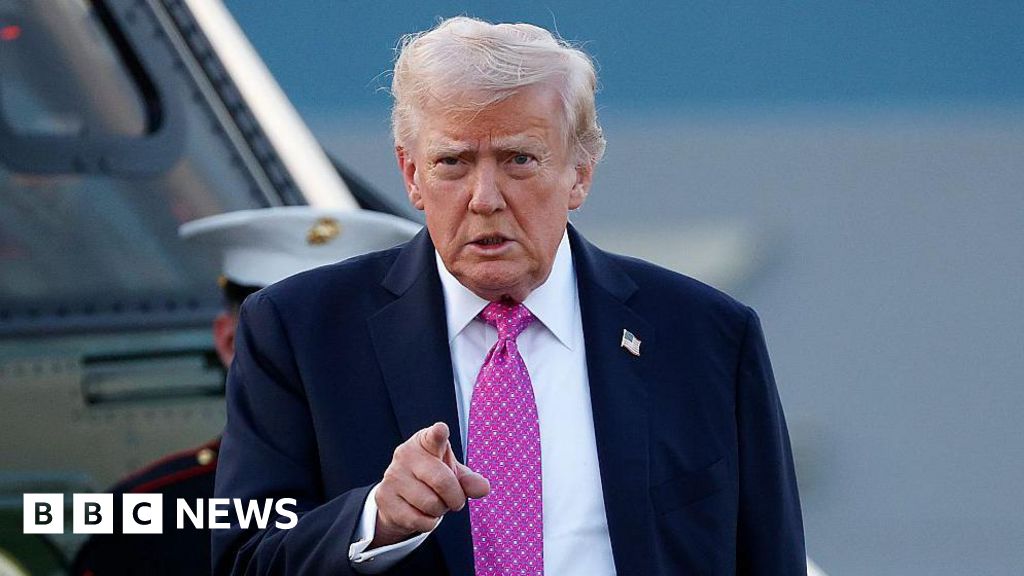
Read full article on post.
President Donald Trump announced a new wave of tariffs on Thursday, including a 100% levy on branded or patented drug imports from 1 October, unless a company is building a factory in the US.
Washington will also impose a 25% import tax on all heavy-duty trucks and 50% levies on kitchen and bathroom cabinets, the US president said as he unveiled the industry-focused measures.
“The reason for this is the large scale “FLOODING” of these products into the United States by other outside Countries,” Trump wrote on his Truth Social platform, citing the need to protect US manufacturers.
The announcements come despite calls from US businesses for the White House to not impose further tariffs.
The new tariffs could impact major producers of branded pharmaceuticals – including the UK, Ireland, Germany, Switzerland and Japan.
The UK exported more than $6bn (£4.5bn) worth of pharmaceutical products to the US last year, according to the United Nations.
A UK government spokesperson said: “We know this will be concerning for industry, which is why we’ve been actively engaging with the US and will continue to do so over the coming days.”
Jane Sydenham, investment director at Rathbones, said speculation over tariffs for pharmaceuticals meant the sector had endured a “rollercoaster ride” over the past few months.
“The pharmaceutical sector in terms of share prices has been under pressure for quite some time both in the UK and the United States and Europe so nobody likes uncertainty and that’s been keeping a cloud over the sector for a while,” she told the BBC’s Today programme.
However, Neil Shearing, chief economist at Capital Economics, said the tariff announcements were “not quite as big a move as it appears at first sight”.
This was due to the exemptions available to generic drugs and to those firms building factories in the US.
“Many of the world’s largest pharmaceutical companies either already have some production in the US or have announced plans to build production in the near future,” he said.
The tariffs on heavy trucks would protect US manufacturers from “unfair outside competition” and that the duties would help lift American companies such as Peterbilt and Mack Trucks, Trump said.
These firms “will be protected from the onslaught of outside interruptions”, he wrote.
The new levies on kitchen and bathroom cabinets, as well as some other furniture, were in response to high levels of imports, which hurt local manufacturers, the president said.
He added that the US would start charging a 30% tariff on upholstered furniture from next week.
The new duties came as Trump expands his tariff policies, which have been a key feature of his second term in the White House.
Trump’s sweeping tariffs on more than 90 countries came into effect in early August, as part of his policies aimed at boosting jobs and manufacturing in the US, among other political goals.
He previously imposed sector-specific tariffs on steel, copper, aluminium, cars and vehicle components.
Earlier this year, the US Chamber of Commerce urged the White House to not introduce new tariffs, arguing that many parts used in truck production are sourced “overwhelmingly” from countries like Mexico, Canada, Germany, Finland and Japan.
The organisation added that these countries are “allies or close partners of the United States posing no threat to US national security.”
Mexico and Canada are among the biggest suppliers of parts for medium and heavy-duty trucks, accounting for more than half of total US imports in the sector last year, said the chamber.
It warned that it was “impractical” to expect many of these parts to be sourced domestically, resulting in higher costs for the industry.
The new tariffs favour domestic producers but are “terrible” for consumers as prices are likely to rise, said trade expert Deborah Elms from research firm Hinrich Foundation.
The levies would cover more products at higher rates than Trump’s reciprocal tariffs, which were aimed at correcting trade imbalances with other countries.
These industry-specific import taxes could serve as a back-up plan to secure revenues as Trump’s sweeping duties on global trading partners are being challenged in court, said Ms Elms.
Business
Trump announces new tariffs on drugs, trucks and kitchen cabinets

Read full article on post.
President Donald Trump announced a new wave of tariffs on Thursday, including a 100% levy on branded or patented drug imports from 1 October, unless a company is building a factory in the US.
Washington will also impose a 25% import tax on all heavy-duty trucks and 50% levies on kitchen and bathroom cabinets, the US president said as he unveiled the industry-focused measures.
“The reason for this is the large scale “FLOODING” of these products into the United States by other outside Countries,” Trump wrote on his Truth Social platform, citing the need to protect US manufacturers.
The announcements come despite calls from US businesses for the White House to not impose further tariffs.
The new tariffs could impact major producers of branded pharmaceuticals – including the UK, Ireland, Germany, Switzerland and Japan.
The UK exported more than $6bn (£4.5bn) worth of pharmaceutical products to the US last year, according to the United Nations.
Jane Sydenham, investment director at Rathbones, said speculation over tariffs for pharmaceuticals meant the sector had endured a “rollercoaster ride” over the past few months.
“The pharmaceutical sector in terms of share prices has been under pressure for quite some time both in the UK and the United States and Europe so nobody likes uncertainty and that’s been keeping a cloud over the sector for a while,” she told the BBC’s Today programme.
However, Neil Shearing, chief economist at Capital Economics, said the tariff announcements were “not quite as big a move as it appears at first sight”.
This was due to the exemptions available to generic drugs and to those firms building factories in the US.
“Many of the world’s largest pharmaceutical companies either already have some production in the US or have announced plans to build production in the near future,” he said.
The tariffs on heavy trucks would protect US manufacturers from “unfair outside competition” and that the duties would help lift American companies such as Peterbilt and Mack Trucks, Trump said.
These firms “will be protected from the onslaught of outside interruptions”, he wrote.
The new levies on kitchen and bathroom cabinets, as well as some other furniture, were in response to high levels of imports, which hurt local manufacturers, the president said.
He added that the US would start charging a 30% tariff on upholstered furniture from next week.
The new duties came as Trump expands his tariff policies, which have been a key feature of his second term in the White House.
Trump’s sweeping tariffs on more than 90 countries came into effect in early August, as part of his policies aimed at boosting jobs and manufacturing in the US, among other political goals.
He previously imposed sector-specific tariffs on steel, copper, aluminium, cars and vehicle components.
Earlier this year, the US Chamber of Commerce urged the White House to not introduce new tariffs, arguing that many parts used in truck production are sourced “overwhelmingly” from countries like Mexico, Canada, Germany, Finland and Japan.
The organisation added that these countries are “allies or close partners of the United States posing no threat to US national security.”
Mexico and Canada are among the biggest suppliers of parts for medium and heavy-duty trucks, accounting for more than half of total US imports in the sector last year, said the chamber.
It warned that it was “impractical” to expect many of these parts to be sourced domestically, resulting in higher costs for the industry.
The new tariffs favour domestic producers but are “terrible” for consumers as prices are likely to rise, said trade expert Deborah Elms from research firm Hinrich Foundation.
The levies would cover more products at higher rates than Trump’s reciprocal tariffs, which were aimed at correcting trade imbalances with other countries.
These industry-specific import taxes could serve as a back-up plan to secure revenues as Trump’s sweeping duties on global trading partners are being challenged in court, said Ms Elms.
Business
PM ‘remains committed’ to Northern Powerhouse Rail
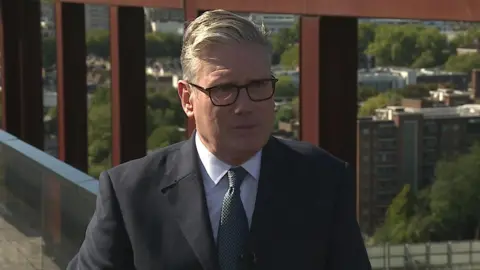
Read more on post.
James VincentPolitical editor, BBC Yorkshire and
Emily JohnsonYorkshire
The prime minister has said his government “remains committed” to Northern Powerhouse Rail amid recent uncertainty over the major infrastructure project.
It comes after plans to extend high-speed rail across the north of England were delayed further, which the BBC understands was due to concerns over long-term costs.
Sir Keir Starmer said he wanted to “get it right” following the scrapping of HS2’s northern phases.
“While I do understand the frustration, I think that anyone who looks at the mess the last government made of HS2 would say getting it right matters rather than taking decisions that unravel like HS2,” he added.
Northern Powerhouse Rail aims to cut journey times between northern towns and cities, including those in Yorkshire.
It would include infrastructure upgrades and new lines but is a plan that numerous politicians have failed to deliver.
The prime minister said £3.5bn had been invested into the upgrade of the existing line, which was announced in the last budget.
On losing ground to Reform in Yorkshire, Starmer said people needed to decide whether they wanted the “toxic divide” that he says that party offers.
“You can have patriotic national renewal with Labour – or the politics of grievance which is Reform – where they want to trade on the problems not fix the problems because if we were to fix the problems their whole reason to exist dies away,” he said.
“We need to make our argument about what we’re doing, also we need to remind people what we have done.
‘Making progress’
Meanwhile, Starmer said while “millions of people voted for change” at last year’s general election, he understood people’s “frustration” at the time it took for that change to be take place.
“It takes time to unpick 14 years of failure,” he said.
“The economy was badly damaged, public services were on their knees. We’re making progress on that.
“We’ve delivered five million extra appointments for the NHS; we’re rolling out childcare for those between nine months and four years; we’re striking trade deals and getting investment in.”
However, Starmer said ahead of the local elections next May, “we need to make our argument about what we’re doing”.
“We also need to remind people what we have done: waiting lists are coming down, confidence in the NHS is going up.
“There’s more to do, I accept that – bringing in the Hillsborough Law to deal with injustices, and trade deals which benefit all parts of the country.”
-
Culture3 days ago
Taylor Swift’s new cinema outing generates more than €12million in just 24 hours
-
Politics3 days ago
European Parliament snubs Orbán with vote to shield Italian MEP from Hungarian arrest
-
Health4 days ago
EU renews support for WHO’s Universal Health Coverage Partnership
-
Culture3 weeks ago
Life, loss, fame & family – the IFI Documentary Festival in focus
-
Environment6 days ago
Key oceans treaty crosses threshold to come into force
-
Culture3 days ago
Twilight at 20: the many afterlives of Stephenie Meyer’s vampires
-
Culture1 week ago
Farewell, Sundance – how Robert Redford changed cinema forever
-
Culture2 months ago
Fatal, flashy and indecent – the movies of Adrian Lyne revisited



